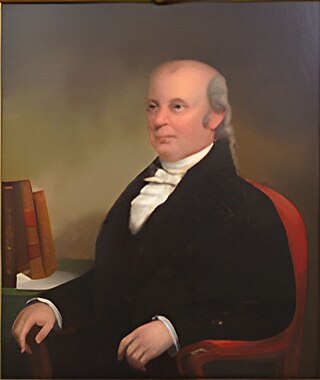
Levi Lincoln Sr. was an American revolutionary, lawyer, and statesman from Massachusetts. A Democratic-Republican, he most notably served as Thomas Jefferson's first attorney general, and played a significant role in the events that led to the celebrated Marbury v. Madison court case. He served two terms as the lieutenant governor of Massachusetts, acting as governor for the remainder of Governor James Sullivan's term after his death in December 1808. Lincoln was unsuccessful in his bid to be elected governor in his own right in 1809.

Caleb Strong was an American lawyer, politician, and Founding Father who served as the sixth and tenth governor of Massachusetts between 1800 and 1807, and again from 1812 until 1816. He assisted in drafting the Massachusetts State Constitution in 1779 and served as a state senator and on the Massachusetts Governor's Council before being elected to the inaugural United States Senate. A leading member of the Massachusetts Federalist Party, his political success delayed the decline of the Federalists in Massachusetts.

James Sullivan was an American lawyer and politician in Massachusetts. He was an early associate justice of the Massachusetts Supreme Judicial Court, served as the state's attorney general for many years, and as governor of the state from 1807 until his death.

Increase Sumner was an American lawyer, jurist, and politician from Massachusetts. He was the fifth governor of Massachusetts, serving from 1797 to 1799. Trained as a lawyer, he served in the provisional government of Massachusetts during the American Revolutionary War, and was elected to the Confederation Congress in 1782. Appointed to the Massachusetts Supreme Judicial Court the same year, he served there as an associate justice until 1797.

Moses Gill was an American merchant and politician who served as the acting governor of Massachusetts from 1799 to 1800, when he died in office, the only acting governor to do so. A successful businessman, he became one of the most prominent colonists in Princeton, Massachusetts, entering politics shortly before the American Revolutionary War. He served on the Massachusetts Provincial Congress's executive committee until the state adopted its constitution in 1780, after which he continued to serve on the state's Governor's Council.
A Massachusetts general election was held on November 4, 1952 in the Commonwealth of Massachusetts. Primary elections took place on September 16.

The 1800 Massachusetts gubernatorial election was held on April 7.

The 1804 Massachusetts gubernatorial election was held on April 2.

The 1805 Massachusetts gubernatorial election was held on April 2.

The 1812 Massachusetts gubernatorial election was held on April 6, 1812.

The 1811 Massachusetts gubernatorial election was held on April 1, 1811.

The 1810 Massachusetts gubernatorial election was held on April 2, 1810.

The 1809 Massachusetts gubernatorial election was held on April 3, 1809.

The 1808 Massachusetts gubernatorial election was held on April 4, 1808.

The 1807 Massachusetts gubernatorial election was held on April 6, 1807.

The 1799 Massachusetts gubernatorial election was held on April 1.

The 1797 Massachusetts gubernatorial election was held on April 3.

The 1796 Massachusetts gubernatorial election was held on April 4.

The 1795 Massachusetts gubernatorial election was held on April 6.

The 1794 Massachusetts gubernatorial election was held on April 7.


















